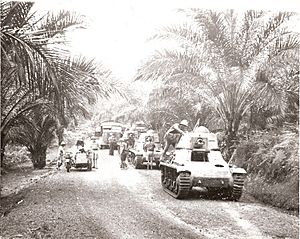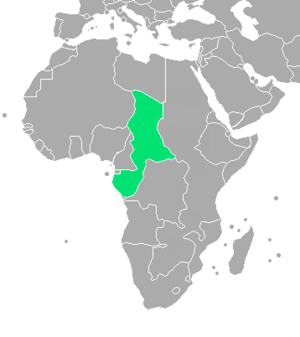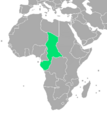Battle of Gabon facts for kids
The Battle of Gabon (also called the Gabon Campaign) happened in November 1940 during World War II. In this battle, forces loyal to General Charles De Gaulle took control of the French colony of Gabon and its capital, Libreville. They took it from Vichy France, which was the French government that worked with Germany at the time. This victory meant that all of French Equatorial Africa joined the side of Free France.
Quick facts for kids Battle of Gabon |
|||||||||
|---|---|---|---|---|---|---|---|---|---|
| Part of World War II | |||||||||
 Free French Hotchkiss H39 tanks during the Battle of Gabon |
|||||||||
|
|||||||||
| Belligerents | |||||||||
|
|
||||||||
| Commanders and leaders | |||||||||
|
|||||||||
| Strength | |||||||||
| Free French: 1,060 men 1 aviso 1 minesweeper 1 cargo ship Royal Navy: 1 heavy cruiser 1 sloop |
1,500 men 1 aviso 1 submarine |
||||||||
| Casualties and losses | |||||||||
| 20-100 killed 4 aircraft destroyed |
At least 35 killed 1 aviso destroyed 1 submarine scuttled |
||||||||
Contents
Why the Battle Happened
France's Defeat and New Government
In June 1940, Germany invaded and defeated France. A part of France was then taken over by Germany. A new French government was set up in a town called Vichy. This government, led by Philippe Pétain, worked with Germany and controlled the parts of France that Germany didn't occupy.
De Gaulle's Call to Action
On June 18, 1940, French General Charles De Gaulle spoke on the radio from Britain. He asked all French people abroad to reject the Vichy government. He urged them to join the United Kingdom in fighting against Germany and Italy. This message caused a big split in France's African territories. People there had to choose which side to support.
African Colonies Choose Sides
Many French colonies in Africa decided to join De Gaulle's Free French Forces.
- On August 26, the leaders in French Chad announced they would support De Gaulle.
- The next morning, a small group of De Gaulle's supporters took control of French Cameroon.
- On August 28, a Free French official removed the pro-Vichy governor of French Congo.
- The next day, the governor of Ubangi-Shari also declared support for De Gaulle.
By the end of August, almost all the colonies that made up French Equatorial Africa had joined Free France. Only French Gabon remained loyal to the Vichy government.
Gabon's Decision
On August 28, 1940, Gabon's Governor Georges Masson first promised to join Free France. However, many French people in Gabon and the powerful Catholic bishop, Louis Tardy, disagreed. They preferred the Vichy government. Under pressure, Governor Masson had to change his mind. Free French supporters in Gabon were then arrested or sent away.
De Gaulle was very upset that Gabon didn't join him. He saw it as a "hostile area" right in the middle of his African territories. He knew that if Gabon didn't join, it would make it harder for Free France to be seen as a strong force in Africa.
Getting Ready for Battle
Securing Borders
After Cameroon joined Free France on August 27, the Vichy leaders in Gabon decided to strengthen their border with Cameroon. This was along the Ntem river.
On September 3, a Free French officer named Roger Gardet entered the town of Bitam using a clever trick. He pretended he needed medical help to cross the border. The local Vichy commander agreed to join Free France only if his boss, Besson, did too. Besson first refused, but Gardet removed him from his command. On September 6, Free French forces took over Bitam and Oyem.
Vichy Reinforcements Arrive
On September 11, Governor Masson met with his army and navy commanders. They decided to send more troops to Mayumba. On September 15, Vichy reinforcements arrived on a ship called Cap des Palmes. A submarine named Poncelet escorted it. These reinforcements included marines and defenders for Port-Gentil.
While the submarine's captain was having breakfast, Free French soldiers took over the administrator's house. After talks, the captain was allowed to leave with anyone who didn't want to join Free France. Most of the marines chose to stay in Mayumba and join the Free French.
De Gaulle's Plan
On October 8, De Gaulle arrived in Douala, Cameroon. Four days later, he approved plans to invade French Equatorial Africa. He wanted to use this area as a base to attack Libya, which was controlled by Germany and Italy. Because of this, he went north to see the situation in Chad, which is on Libya's southern border.
The Battle Begins
On October 27, Free French forces entered French Equatorial Africa and captured the town of Mitzic.
On November 5, the Vichy soldiers in Lambaréné gave up. Meanwhile, the main Free French forces, led by General Philippe Leclerc and Major Marie Pierre Koenig, left from Douala, French Cameroon. Their goal was to capture Libreville, the capital of French Equatorial Africa.
The British were unsure if De Gaulle could take control of the Vichy territory. But they eventually agreed to help the Free French with their navy. An officer reported that after a few days of fighting, 150 prisoners were taken. These prisoners later chose to join the Free French on their own.
On November 8, 1940, a British ship called HMS Milford found the Vichy submarine Poncelet. The submarine was following the British and French ships. The Milford chased the submarine, but it was too slow. So, Admiral Cunningham ordered his main ship, HMS Devonshire, to launch its Supermarine Walrus airplane.
The plane dropped two depth charges near the submarine as it tried to dive. This damaged the submarine. Its captain decided to sink the submarine off Port-Gentil and went down with his vessel.
Taking Libreville
Koenig's forces landed at Pointe La Mondah on the night of November 8. His troops included French Legionnaires, Senegalese, and Cameroonian soldiers.
On November 9, Free French planes from Douala bombed the Libreville aerodrome (airport). The airport was eventually captured, even though Koenig's forces faced strong resistance.
Free French naval ships, including the minesweeper Commandant Dominé and the cargo ship Casamance, carried out operations along the coast. They were led by Georges Thierry d'Argenlieu on the ship Savorgnan de Brazza. The De Brazza attacked and sank its sister ship, the Vichy French Bougainville. Libreville was captured on November 10.
On November 12, the last Vichy forces at Port Gentil surrendered without a fight.
What Happened Next
Losses and Prisoners
The Free French lost four aircraft and six aircrew during the campaign. The exact number of people killed is not fully agreed upon. De Gaulle said "about twenty" died. Other reports say between 33 and 100 people were killed. One account states that 35 Vichy troops were killed, compared to 8 Free French soldiers.
On November 15, De Gaulle personally tried to convince the captured Vichy soldiers to join Free France. Most of them, including General Marcel Têtu, refused. So, they were kept as prisoners of war in Brazzaville, French Congo, for the rest of the war.
New Plans and Legitimacy
With control of Equatorial Africa, the Free French started to focus on the campaign in Italian Libya. De Gaulle moved General Leclerc from Cameroon to Fort Lamy, Chad. Leclerc's job was to prepare for attacks into Libya.
The conflict in Gabon caused many Gabonese people to move to Spanish Guinea. French Equatorial Africa stopped trading with the Vichy-controlled territories in West Africa. Instead, it rebuilt its economy by trading with nearby British areas, like Nigeria.
Even after the invasion, there were still tensions between the Vichy and Free French groups. Taking control of Gabon and the rest of French Equatorial Africa gave Free France much more importance. It was no longer just a group of exiles in Britain; it now had its own large territory to govern.
Images for kids
 | Misty Copeland |
 | Raven Wilkinson |
 | Debra Austin |
 | Aesha Ash |



